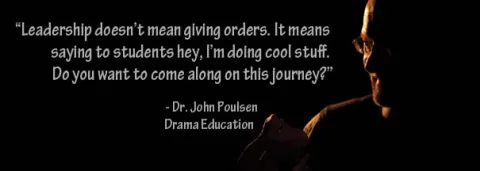O! For the Muse of Teaching

"As a teacher, you set the milieu. Modelling how you want your students to interact is job one." - Dr. John Poulsen
‘Consider your audience’ is a common theme in Dr. John Poulsen’s research. The four years he spent as Assistant Dean in the University of Lethbridge Faculty of Education informed the drama professor’s study into top skills for practicum teachers whose audience is their students.
“Know your kids,” says Poulsen. “Start by finding out and using the names they want to go by.” Middle school students in particular often prefer derivatives of their given names.
“As a teacher, you set the milieu,” he says. “Modelling how you want your students to interact is job one.” He recommends planning in advance how to handle situations that might arise. For tips on time management he suggests checking a watch instead of a cell phone. “Pulling out a cell phone sends the wrong message to kids, and it takes time. Glancing at a wristwatch is much more efficient.”
Poulsen advocates conveying a sense of reward by ending a class two minutes early. “There’s nothing better than saying ‘you’ve really worked hard today. Congratulations. Talk amongst yourselves until the bell goes.’”
Student teachers continue to learn by evaluating their own performances. “Figure out what went wrong or right and create a plan,” he says. “Repeat this time and again.”
“Suggestions for improvement can come most strongly from classroom students,” he adds, “but you’ve got to be ready to hear it.”
Each year Poulsen conducts Teacher as Performer workshops for PS1 students. “I use drama-based activities to examine the teaching profession,” he says. He emphasizes, however, that teaching is not about performing for students. “It’s about student learning.”
“Be a leader,” he says. “That’s really the number one thing. Leadership doesn’t mean giving orders. It means saying to students hey, I’m doing cool stuff. Do you want to come along on this journey?”
With his background in theatre Poulsen favours learning by doing, an approach embodied in a new book he’s developed. “My audience is primarily teachers who have to teach Shakespeare,” he says. “I’ve abridged Hamlet, Romeo and Juliet and A Midsummer Night’s Dream into forty-five- and twenty-minute Readers’ Theatre versions.”
Students practice a play one day and perform it the next. “They find it pretty entertaining even just sitting and reading,” says Poulsen. He asserts that by actually engaging with the material students learn more and have more fun. “It’s as simple as that,” he says.
A Play in a Day:
Shakespeare fast-tracked for increased teaching success
John Poulsen's book "Shakespeare for Readers' Theatre"
Shakespeare for Readers' Theatre is a Readers' Theatre collection of three of Shakespeare's plays in abridged form. In this first book of the series, three of Shakespeare's most beloved plays are presented: Hamlet, Romeo and Juliet, as well as Midsummer Night's Dream, and have been trimmed while keeping Shakespeare's beautiful language.
Hamlet can run more than four hours but this Hamlet will run less than 45 minutes while keeping most of the great lines. Not short enough? The book contains an even shorter version of Hamlet that should run less than 20 minutes. That is, each of the Shakespeare plays have two Readers' Theatre versions, the long version intended to run 45 minutes and the short version intended to run about 20 minutes.
Shakespeare for Readers' Theatre also includes an introduction to the each of the plays including probable original sources, first production dates, and important historical information. Further, each of the Readers' Theatre long versions have attached suggested director's notes. These notes include interpretations of the text, definitions, blocking suggestions, and character recommendations. The book is intended as an important practical resource for theatre practitioners, directors, and teachers.
